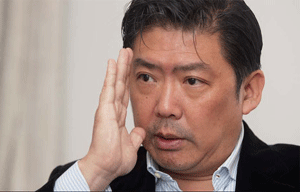Concern over currency bill
Updated: 2011-10-14 07:52
By He Wei (China Daily)
|
|||||||||
|
A woman shelters next to a currency exchange bureau in Hong Kong. The Chinese currency bill passed by the US Senate is likely to see a dramatic change when a vote is taken in the House of Representatives, said Gary Locke, the US ambassador to China. Jerome Favre / Bloomberg |
White House worried about violation against world trade rules
SHANGHAI - The White House has "serious concerns" about the yuan bill passed by the US Senate earlier this week, and the legislation might change "very dramatically" when it reaches the House of Representatives, US Ambassador to China Gary Locke said on Thursday.
Many provisions of the bill that would punish what it classifies as Beijing's currency manipulation are highly problematic in terms of violating international trade rules, Locke said in Shanghai.
"On the passage of the bill by the Senate, it is not a final action by the US Congress. The White House has serious concerns ... that many elements violate international trade rules, and we have expressed those deep concerns to the members of Congress," Locke said.
The ambassador emphasized that the White House wants to work with Congress to make sure that whatever legislation is passed is consistent with international agreements.
In a speech to the American Chamber of Commerce in Shanghai, Locke also announced a plan to lead five trade and investment missions to China's emerging cities over the next year to promote US exports and attract Chinese investment to boost job opportunities.
"We simply cannot wait for the Commerce Department or the Energy Department and other governors and mayors to lead trade missions here to China. There's no reason why the embassy and the consulates here can't initiate these trade missions on our own," he said.
Under the auspices of SelectUSA, a new US effort to remove barriers to new investments by the government, Chinese companies can learn about investment opportunities in the US through workshops and visits, Locke said.
"There are a lot of misunderstandings about the climate of investment in the US. The initiative seeks to break down and dispel some of these misunderstandings and ... unlock the full potential of the US-China relationship," Locke noted.
His remarks came amid renewed tensions over the value of the yuan. The Senate on Tuesday approved a bill that, if it becomes law, will pave the way for tariffs on certain Chinese goods to offset job losses in the US.
China said on Wednesday that the "essentially protectionist" bill was on the verge of triggering a trade war.
In response, Locke told the media that "the last thing the US or China wants would be to have a trade war where everybody loses ... we must do everything possible to avoid it".
Analysts see a slim chance of the bill becoming law. Dan Steinbock, research director of International Business at the India China America Institute, said that along with the US House, the litmus test of the bill will be the US Treasury's next report and its view of the yuan, presumably in the coming days.
"The White House is engaged in a difficult balancing act. However, the currency bill is driven by protectionist goals.
"Some harm has already occurred even if the bill is not passed. As a result, the challenge now is to strengthen trust in US-Chinese relations, not to pave the way for a trade war that would hurt both" sides, Steinbock said in an e-mailed reply to questions from China Daily.
US executives in China tend to be more vocal about this issue. Robert Roche, chairman of Acorn International Inc , a major marketing company, and vice chairman of the AmCham Shanghai, didn't expect the bill to become law.
"People who are sponsoring the renminbi issue clearly have an agenda and a political point of view, because politically it is good for America to find a bad guy to blame for its high unemployment rate, and they found China," Roche told China Daily.
Roche said the US private sector in general is disappointed the Senate has made the exchange rate into the top issue in bilateral economic relations.
"Currency rates are indeed a multinational issue. Making them a bilateral one is not to the advantage of Americans," he said.











